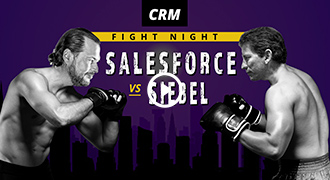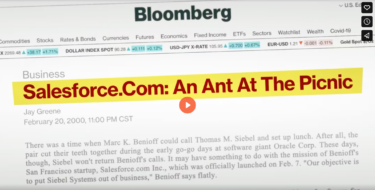
Part 1: Siebel vs. Salesforce
Who doesn’t love a great business story?! The battle for the CRM market waged between Siebel and Salesforce was epic. And the objections Salesforce overcame will sound totally familiar to you telco execs.

Cinderella, David vs. Goliath, Miracle on Ice. Who doesn’t love a great underdog story? Everyone loves to hear about the time the small guy took on the top dog and came out ahead. Which is why I love great business stories about how innovative, brave start-ups had the courage to stand up, go against the status quo, and upset the big incumbent in the end.
Well, there’s a great one out there that maybe you don’t know. The story of Siebel Systems and Salesforce. In the late 1990s, Oracle-exec Tom Siebel founded his own firm – Siebel Systems – which would go on to become the fastest-growing tech firm in the US. By the year 2000, it was definitely the top dog. It had 45% market share for its full stack, on-premise CRM package, which was installed at some of the world’s largest companies. Its stock had risen from an IPO price of $2 USD in 1996 to an incredible $120 USD by November 2000.
But then this little tiny challenger called Salesforce came along. Back in 2000, Marc Benioff had a great idea – there should be just one CRM. Companies didn’t need their own CRM, installed on premise. His idea was to build the world’s first webscale enterprise application in CRM, with NO software to install.
Marc’s idea was that customers would pay just to use it, accessing the software through the internet. And NOTHING would be installed on premise. The one catch was that customers would have to give up control of the application stack and let Salesforce manage their valuable customer data for them. Back in 2000, this was a radical new idea. At the time, everyone else was still shipping DVD-ROMs of software (remember those days?!?) and buying servers on which to install them. Salesforce would have none of that. Instead, customers would access it via a website, set it up and start using it easily, and receive value immediately. Even better: it would be cheap as hell. People didn’t know it at the time, but Salesforce was about to invent SaaS software.
Even though the public cloud hyperscalers hadn’t been invented yet, the idea of running enterprise software on someone else’s computers, where you didn’t control every element of the stack, was an insane idea. So you can imagine the objections everyone had: it wasn’t secure enough, concerns about data privacy, what would happen to their customizations and integrations to other systems, and what if the internet went down and they couldn’t access their data?
As I was researching the Siebel vs. Salesforce story, I literally LAUGHED OUT LOUD because the list of objections is the same list I get from telco execs on why they can’t use the public cloud. It may be 21 years later, but the objections to the public cloud are the same.
But a new underdog is in town, and it’s coming to the telco industry. I know a startup that has the best product for telco I’ve ever seen, and I know a thing or two about its area. This team is in stealth mode and is not ready to be launched just yet, but I begged them to let me give you just a little taste of what it’s working on because I think it’s the most exciting thing going. What I love is that it’s everything I’ve been banging my drum about for the last several years, and I’m excited to share a couple of small details.
The startup is called Totogi and it is building a webscale public cloud charging engine that can handle 100% of the world’s charging volume on one platform. It will be built just like Salesforce: fully SaaS with nothing to install. Instead of talking to you about infrastructure, datacenters, servers, databases supported, Red Hat, Kubernetes, BLAH BLAH BLAH … Totogi’s main focus is on three huge business value drivers:
I can’t wait to hear more about Totogi in a few months’ time. It will debut its products at MWC and it is already scheduling private viewing opportunities for interested customers.
In the meantime, you can hear a little more about why I think Totogi is destined for success during my KILLER talk at TelecomTV’s annual DSP Leaders World Forum, taking place March 8 – 12.
Can’t wait to hear your thoughts about it. Send me a message on Twitter or LinkedIn!

dr
Recent Posts

 Get my FREE insider newsletter, delivered every two weeks, with curated content to help telco execs across the globe move to the public cloud.
Get my FREE insider newsletter, delivered every two weeks, with curated content to help telco execs across the globe move to the public cloud.